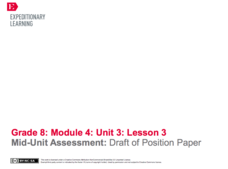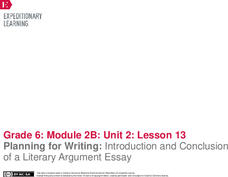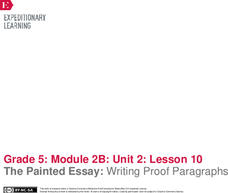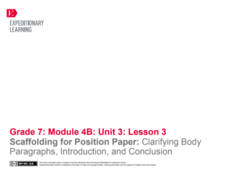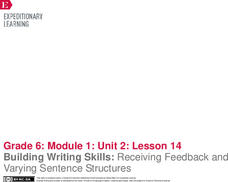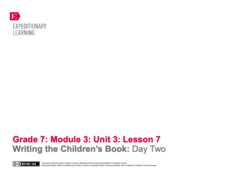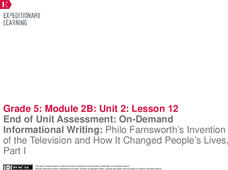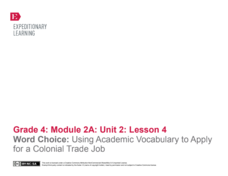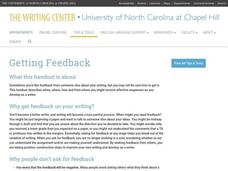Curated OER
Proofreading, Revising, & Editing Skills Success
Some self-paced writing resources are just better than others. This one is great. The 205-page packet includes exercises on every aspect of the writing process, from crafting sentences and paragraphs, to proofreading, revising, and...
Portland Public Schools
Opinion: Persuasive Essay Unit Introduction
Opinion, audience, purpose. Fourth graders are introduced to the three characteristics of persuasive writing in the third unit of a year-long writing program. The 98-page packet is complete with plans, model essays, graphic organizers,...
Curriculum
Expository Writing
The beauty of the way this expository writing resource is structured is that the units can be presented as a complete writing workshop or sequenced throughout a course of study
EngageNY
Writing: Drafting Body Paragraphs and Revising for Language
Begin the drafting phase of the writing process with a lesson plan focused on logically writing three body paragraphs. Then, revise the writing to make it more formal after a teacher-directed mini-lesson plan. Each paragraph highlights...
Anchorage School District
Hints for Writing a Conclusion
Writing the conclusion of an essay can often seem like a superfluous or daunting task. Support your young writers in understanding the various types and purposes of a conclusion paragraph, such as summarizing key points of a paper or...
EngageNY
Mid-Unit Assessment: Draft of Position Paper
What is the purpose of an introduction and conclusion? Using the resource, scholars review the model position paper from activity one and discuss the author's choices. Next, they draft their position papers' introductory and concluding...
EngageNY
Planning for Writing: Introduction and Conclusion of a Literary Argument Essay
Give a powerful introduction. Scholars analyze the introductory paragraph in the model essay "Are We Medieval?: Opportunities in the Middle Ages and Today." They discuss the key components the author includes and then walk through the...
EngageNY
Planning the Introductory and Concluding Paragraphs of the End of Unit Assessment Essay
Preparation is the key to success! Using the guiding resource, scholars plan their end-of-unit analytical essays' introductory and concluding paragraphs based on their reading of Inside Out & Back Again. To prepare, they complete a...
EngageNY
The Painted Essay: Writing Proof Paragraphs
Words of proof. Learners continue coding The Electric Motor by marking the first point in yellow and the second point in blue. They discuss the structure of the paragraphs by identifying transition words and evidence to support the given...
K20 LEARN
Writing Wrongs Mini Lesson: Peer Editing And Revising
High schoolers draft a paragraph about their stance on the issue of school uniforms and share their work with a peer for editing. After watching a parody video about peer editing and revising, class members generate a "Top 10 list" of...
EngageNY
Scaffolding for Essay: Planning Body Paragraphs for Position Paper This work is licensed under a Creative Commons Attribution-NonCom
Scholars begin creating a plan for their position papers using a Sustainable Water Management Position Paper Planner. They talk with partners about their claims and counterclaims for the essays. Writers then work independently to plan...
EngageNY
Scaffolding for Position Paper: Clarifying Body Paragraphs, Introduction, and Conclusion
Let's have a talk. Scholars talk through the body paragraphs of their Sustainable Water Management position paper with peers. They take turns explaining their work to one another. They then begin to work independently on the introduction...
EngageNY
Building Writing Skills: Receiving Feedback and Varying Sentence Structures
Everyone is good at something. Scholars receive their mid-unit assessments with feedback. They look over their papers and write their strengths as a writer and goals on index cards. The class then has a mini instructional activity in...
EngageNY
End of Unit On-Demand Informational Writing: Philo Farnsworth’s Invention of the Television and How It Changed People’s Lives, Part 2
Scholars complete the unit by finishing their end of the unit assessments. They arrange sentences for an introductory paragraph in the correct order, provide evidence for their thinking, and write a conclusion paragraph. They then...
EngageNY
Using Quotes and Opinion Writing: Ingenious Inventions by Women
Scholars complete multiple reads of Ingenious Inventions by Women: The Windshield Wiper and Paper Bag machine to determine gist, use quotes, define words, and form an opinion about the importance of the interventions. Learners work in...
Birmingham City Schools
Stick to the Point: Getting It Right with Constructed Responses
Practice writing constructed responses with a 26-slide presentation. Developed to guide scholars through the appropriate steps, the resource assists them in providing a well-considered answer.
EngageNY
End of Unit 2 Assessment, Part 2: Revise Essay Drafts
Time to revise! Scholars revise their argument essays based on Shakespeare's A Midsummer Night's Dream using feedback from their teacher and peers. They begin their revisions after reviewing a mini-lesson plan on proper writing conventions.
University of Minnesota
Writing for Success
You can be a success! Scholars learn skills required for successful writing with a step-by-step process. They begin with the basics of parts of speech, such as indefinite pronouns, and writing a simple sentence. Individuals then build...
EngageNY
Writing the Children’s Book: Day Two
Following a brief mini-lesson on using dialogue in fiction, young writers continue day two of their writing workshop. They work on the second half of their Children's Book Storyboards, and then they turn and talk with partners to reflect...
EngageNY
End of Unit 2 Assessment, Part 2: Revise Essay Drafts
Positive feedback is a great way to improve writers' skills. Scholars receive their draft essays back with teacher comments and start the revision process. Next, they prepare to begin their final drafts at home.
EngageNY
End of Unit Assessment: On-Demand Informational Writing: Philo Farnsworth’s Invention of the Television and How It Changed People’s Lives, Part I
On-demand isn't just for TV anymore. Writers complete their end of the unit assessment with an on-demand writing task. They read the article Television and answer questions about the gist, vocabulary, and content. They then complete a...
EngageNY
Word Choice: Using Academic Vocabulary to Apply for a Colonial Trade Job
Scholars reflect upon colonial jobs such as a blacksmith, cooper, shoemaker, etc. Together, the class writes a job application as a practice for working independently. Learners employ their experience in writing a job application for a...
University of North Carolina
Getting Feedback
As many writers know, you are your own worst editor. The 10th installment in the Writing the Paper series explains that getting feedback from others is crucial to the writing process. The handout highlights the best time to ask others to...
Blinn College
The Writing Process
Lead your learners through the different stages of the writing process. Show them this presentation as they work through a writing assignment, breaking it up over several days of work. You might also post this on a class website as a...
Other popular searches
- Writing a Paragraph
- Five Paragraph Essay Writing
- 5 Paragraph Essay Writing
- Persuasive Paragraph Writing
- Example Paragraph Writing
- Hamburger Paragraph Writing
- Esl Paragraph Writing
- Narrative Paragraph Writing
- Paragraph Writing Dialogue
- Five Paragraph Writing
- English Paragraph Writing
- Sensory Paragraph Writing







